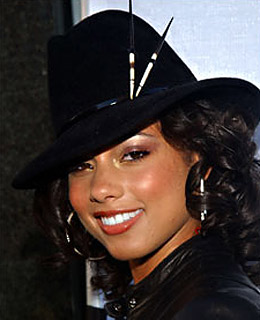
Alicia Keys adores Biggie Smalls and Stevie Wonder, Chopin and Monk, Burt Bacharach and U2. She's a child of hip-hop who's also a product of the Suzuki method, a musical prodigy who, as a teen, had to choose between Columbia University and Columbia Records. She's known for mixing street cool and sophistication, but the very first song the pianist-singer-songwriter can remember playing is R&B crooner Brian McKnight's almost embarrassingly sentimental One Last Cry. She didn't have the sheet music, but that didn't stop her. "I just sat at the piano and listened to it and figured it out," she says. At the time, she was 12 years old.
Keys, now 24, loves taking musical matters into her own hands. Few of today's young pop stars are known for playing instruments of any sort; youthful musicianship is so rare that Save the Music-type programs have been started to rescue the art, as if it were an endangered bird species. Keys, who was born Alicia Augello Cook, so loves the keyboard that it helped form the basis for her stage name. Her musicianship raises her above her peers. She doesn't have to sample music's past like a DJ scratching his way through a record collection; she has the chops to examine it, take it apart and create something new and personal with what she has found. Her best songs, like If I Ain't Got You, sound old school and newfangled all at once. She's a work in progress as a songwriter, but that's a refreshing contrast to many other twentysomething performers who are churned out as depressingly artificial finished products. What will Keys do next? You get the sense she'll figure it out.
From the Archive
The Princess of Queens: Alicia Keys' first CD sent her into the stratosphere. But for her second, she refuses to put on any airs